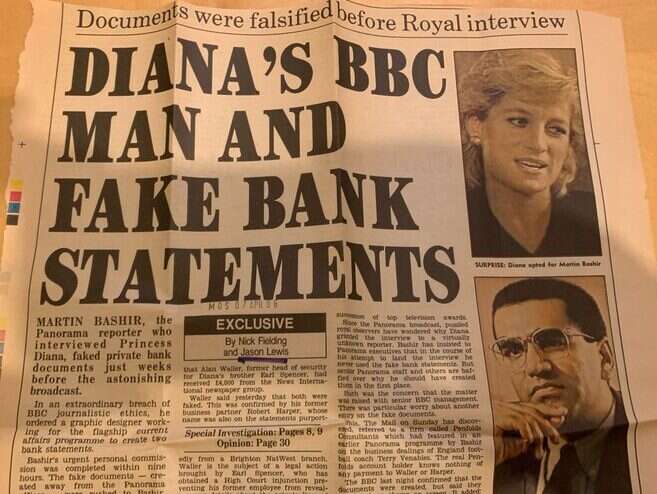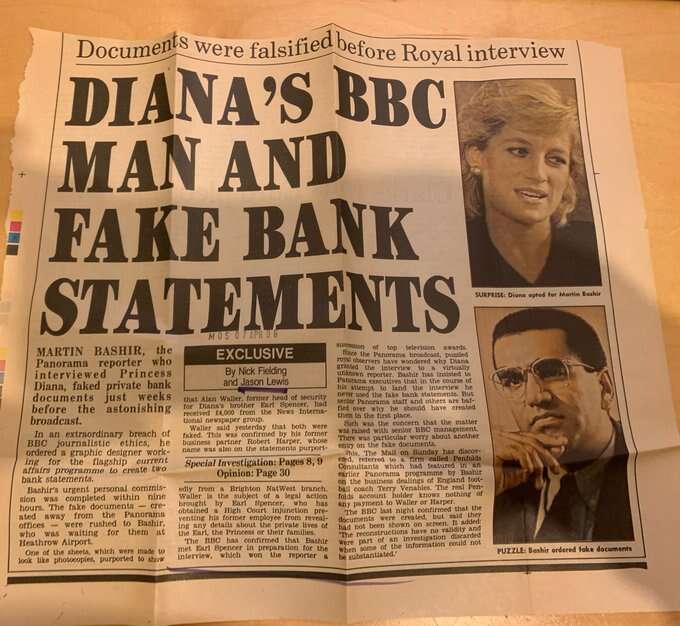
The Mail on Sunday journalists who broke the story 24 years ago that Panorama’s Martin Bashir falsified bank statements to help secure his Princess Diana interview have spoken out to Press Gazette.
Nick Fielding, who together with Jason Lewis broke the story in April 1996, said he felt their splash should be considered for Scoop of the Year at the 2020 British Journalism Awards, adding he had been tempted to write to the current Mail on Sunday editor Ted Verity to ask him to submit it.
“It was unduly and unjustly denied that recognition at the time,” Fielding told Press Gazette.
“We brought in the biggest story of the year and we should be given due credit for that.”
Fielding added: “I feel very strongly about it. We did our job. We acted as good journalists. We stood up a story that has not been faulted in any respect.
“All that’s happened is everyone else has climbed on board and suddenly realised that what we got was valuable. I feel Press Gazette should have a special award.
“It was a great story and it was ignored for all sorts of reasons which we now know are because of lies and everything else. I was very proud of it as a piece of work.”

Mail on Sunday scoop April 1996 on allegations Martin Bashir faked private bank documents ahead of his Princess Diana Panorama interview. Picture: Jason Lewis
Fielding and Lewis revealed Bashir had asked a BBC graphic designer to create bank statements, which purported to show the former head of security for Diana’s brother Earl Spencer had received thousands from News International for information, just weeks before the interview was broadcast in November 1995.
Their splash described Bashir’s actions as “an extraordinary breach of BBC journalistic ethics” and, although the broadcaster confirmed the documents had been created, their significance was downplayed following an internal investigation into whether Diana was misled.
Now, however, director-general Tim Davie has apologised to Earl Spencer and pledged a “robust and independent” investigation – although graphic designer Matt Wiessler and Alan Waller, the Earl’s ex-head of security who was smeared, have not received an apology.
Fielding saw little interest in the story for a quarter of a century until he was approached by documentary makers, and he appears in the second episode of ITV’s The Diana Interview.
“I feel that that’s how things should have been all along – we should have got a very good show and Bashir should have been fired out there and then for his disgusting techniques,” he said.

BBC journalist Martin Bashir. Picture: PA
Bashir has been unable to answer to the allegations in the past week as the BBC said he is seriously unwell with Covid-19 complications – although the Mail on Sunday published photos of him collecting a takeaway on Friday.
Fielding said the Mail on Sunday’s original reporting did not include further dishonesty Earl Spencer alleges relating to Bashir, but said the fake bank statements were enough to call the journalist’s actions into question.
“I worked in Fleet Street for many years and I never saw behaviour like this,” Fielding added.
“This was quite clearly cornering a very vulnerable person and putting them under intense pressure to the point where she and her brother were unable to make a rational decision about what to do.”
His former colleague Lewis agreed, saying that if the allegations were about a tabloid journalist rather than the BBC there would have been “hell to pay”.
Both men pointed out they had shown a “pattern of behaviour” from Bashir, as their follow-up scoop one week later reported that documents were also mocked up for his Panorama investigation into England football manager Terry Venables’ business dealings.
Of the response to their scoop 24 years ago, Lewis said: “Nobody really reacted. The BBC dismissed it because they were protecting their scoop and Earl Spencer didn’t cooperate with us, probably because they didn’t want to damage the credibility of the interview because the interview meant something to them.”
He added: “We were very clear that what we had was proof that these documents were faked, that they were forgeries, and the BBC didn’t really seem to do anything about it at the time. Martin Bashir went off and had a very successful career in America and made lots of money off the fact he was now this very well-known interviewer.”
Lewis said it was “slightly disconcerting” to find himself now part of history.
“At the time we proved that there were these fake documents – the BBC admitted they were fake documents, they played down the significance,” he said.
“Earl Spencer presumably was in a position to say there was some significance to these documents, they had been shown and they had influenced his decision – it’s only now he’s saying that so that’s a question for him. But the story has not really changed.
“Now we know from very good use of the Freedom of Information Act by the documentary makers about what was going on within the BBC but it’s not particularly surprising to us because they were being very difficult and evasive when we were asking these questions 25 years ago.”
Picture: Jason Lewis
Email pged@pressgazette.co.uk to point out mistakes, provide story tips or send in a letter for publication on our "Letters Page" blog
